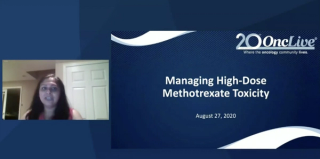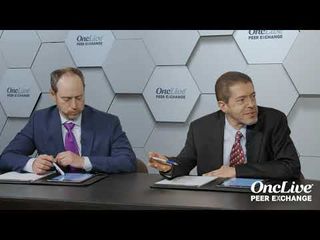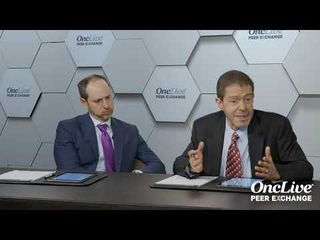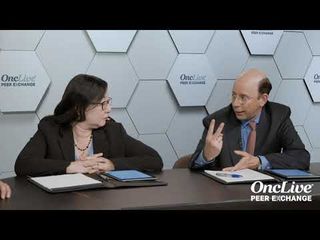
Supportive Care
Latest News

Education, Telehealth, and Access Initiatives Aim to Improve Cancer Care for Veterans
Video Series

Latest Videos
Podcasts
CME Content
More News

The ASCO Palliative Care Expert Panel has offered recommendations to add health equity measures to their palliative care and other future guidelines.

Blake Zenger, MBA, and Brooke Worster, MD, MS, FACP, highlight the importance of personalized cannabis use in alleviating treatment-related symptoms.

Blake Zenger, MBA, and Brooke Worster, MD, MS, FACP, detail a health care cost impacts model pertaining to the use of cannabis for therapy-related symptoms

Crofelemer did not improve the incidence of diarrhea in patients with solid tumors receiving targeted therapy.

Defining the goals of a clinical team within a cancer program or oncology practice group, where the focus will be on maximizing QOL, may be difficult.

Janet Abrahm, MD, FACP, FAAHPM, reviews the standing of the role of integrative therapies in cancer care.

Richard T. Lee, MD, and Edward S. Kim, MD, MBA, discuss the benefits of integrative oncology and exploring integrative approaches at the Cherng Family Center for Integrative Oncology at City of Hope.

Lindsay Wilde, MD, explains when cannabis may be appropriate and how she’s seen the agent affect quality of life for her patients.

Brooke Worster, MD, MS, FACP, and chief medical officer at EO Care, details what oncologists should know about medical cannabis pending the expectant marijuana reclassification from a Schedule I to a Schedule III drug.

The FDA has approved the biosimilars denosumab-bddz (Wyost) and denosumab-bddz (Jubbonti) for use in all indications of the reference medicines denosumab (Xgeva) and denosumab (Prolia).

The FDA granted an orphan drug designation to LUT014 for the treatment of EGFR inhibitor–induced acneiform rash.

The FDA has approved an on-body injector (OBI) presentation of the biosimilar pegfilgrastim-cbqv biosimilar (Udencya), known as Udencya Onbody, which is administered to patients with cancer the day after chemotherapy in order to decrease infection incidence from febrile neutropenia.

The use of talazoparib plus enzalutamide was manageable with dose modifications or standard supportive care treatment in patients with metastatic castration-resistant prostate cancer.

Roxadustat proved to be noninferior to recombinant erythropoietin alfa with regard to change in hemoglobin level from baseline to an average level during weeks 9 to 13 in patients receiving concurrent chemotherapy for non-myeloid malignancies in China, meeting the primary end point of an ongoing phase 3 trial.

Despite American Society of Clinical Oncology guidelines calling for introduction of palliative care early in the course of disease, these services remain underused.

Almost single-handedly, Jennifer Temel, MD, defined a research field in medicine, creating a new focus on quality of life for patients and survivors.

The FDA has approved leuprolide acetate injection for use in the palliative treatment of patients with advanced prostate cancer.

The FDA has approved eflapegrastim-xnst injection to decrease the incidence of infection, as manifested by febrile neutropenia, in adult patients with non-myeloid malignancies receiving myelosuppressive anti-cancer drugs associated with clinically significant incidence of febrile neutropenia.

Most hematology/oncology fellows will care for patients with venous thromboembolism throughout their training and long after their graduation from fellowship. Here are some practical considerations when treating a patient with an acute VTE.

For Dawn Hershman, MD, MS, research and medicine are art forms that she uses to uplift and inspire every day.

Advances in the treatment of solid tumors and hematologic malignancies have resulted in the development of thera-peutic regimens that can be administered at various points in a patient’s care.

Michelle Chi, MD and Jennifer R. Green, MD, share practical points for trainees to approach the initial evaluation for a bleeding-disorder patient.

The FDA has approved maribavir for the treatment of adult and pediatric patients aged 12 years and older weighing at least 35 kg who have post-transplant cytomegalovirus infection that does not respond to available antiviral treatment.

Unsurprisingly, the use of cannabis in patients with cancer appears to be increasing as more and more states are adopting cannabis legislation, both for medical and adult use.

The first-in-class small molecule HIF-PHI inhibitor roxadustat demonstrated promising efficacy with favorable tolerability when used in the treatment of chemotherapy-induced anemia in patients with non-myeloid malignancies, meeting the primary end point of the phase 2 WHITNEY trial.


























































